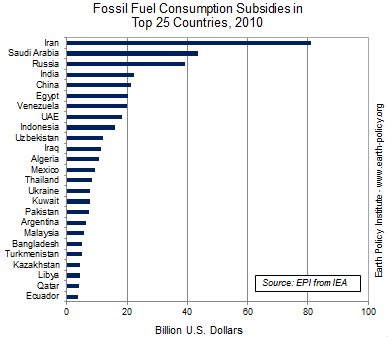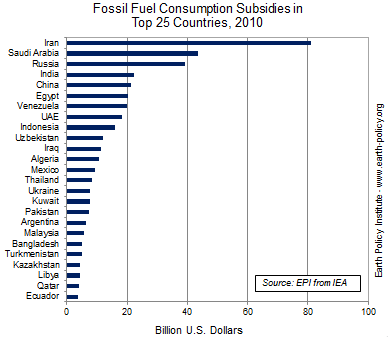by Lester Brown
The world’s governments are shelling out a combined $1.4 billion per day to further destabilize the earth’s climate.
Worldwide, direct fossil fuel subsidies added up to roughly $500 billion in 2010, in contrast to just $66 billion for renewable
energy.
Not only do fossil fuel subsidies dwarf those for renewables today, but a long legacy of governments propping up oil, coal, and natural gas has resulted in a very uneven energy playing field.
Out of the $500 billion in fossil fuel subsidies, $100 billion supports production and $400 billion supports consumption (ie., keeping gas prices low). The oil industry receives $193 billion of that, while natural gas gets $91 billion and coal gets $3 billion. $122 billion is spent subsidizing the use of fossil fuel-generated electricity.
We distort reality when we omit the health and environmental costs associated with burning fossil fuels from their prices. When governments actually subsidize their use, they take the distortion even further.
Iran’s government spent the most of any country to promote fossil fuel consumption in 2010, doling out $81 billion in subsidies, and amounting to over 20% of its gross domestic product. Saudi Arabia was a distant second at $44 billion, followed by Russia ($39 billion), India ($22 billion), and China ($21 billion).

Kuwait’s fossil fuel subsidies were highest on a per capita basis, with $2,800 spent per person. The United Arab Emirates and Qatar followed, each spending close to $2,500 per person.
Carbon emissions could be cut in scores of countries by simply eliminating fossil fuel subsidies. Some countries are
already doing this. Belgium, France, and Japan phased out all subsidies for coal, for example.
As oil prices have climbed, a number of countries that
held fuel prices well below world market prices have greatly reduced or eliminated their motor fuel subsidies because of the heavy fiscal cost, including China and Indonesia.
Even Iran, which priced gasoline at one fifth its market price, dramatically reduced gasoline subsidies in December 2010 as part of broader energy subsidy reforms.
A world facing economically disruptive climate change can no longer justify subsidies to expand the burning of coal and oil.
Over this past year, the typically conservative International Energy Agency has urged governments around the world to stop subsidizing fossil fuels, to set a price on carbon, and to instead subsidize renewable energy to stabilize the earth’s climate.
Eliminating all fossil fuel consumption subsidies by 2020 would reduce global energy demand nearly 5% while reducing government debt.
In 2009, the G20 pledged to stop subsidizing fossil fuels, but that has yet to happen.
++++
This information is adapted from World on the Edge by Lester R. Brown. For more data and discussion, see the full book at:

Dear CCRES friends ,
From June 20-22, the eyes of the world will be on Rio de Janeiro, Brazil. World leaders, drawn by the United Nations Conference on Sustainable Development (aka “Rio+20”), will decide how to deal with a broad range of issues that affect the environment. Earth Day Network will be there to make sure your voices are heard.
You can learn more at http://www.earthday.org/rio.
More of renewable energy at http://ccres.yolasite.com/
Rio+20 offers a chance to jumpstart the green economy and chart a course to a sustainable future. But this will be next to impossible if fossil fuel subsidies continue hampering the progress of clean energy technology.
Please sign this petition asking leaders at Rio+20 to create a plan to phase out fossil fuel subsidies around the world. And then share the petition with friends.
http://solarserdar.wordpress.com/2012/05/25/end-fossil-fuel-subsidies/